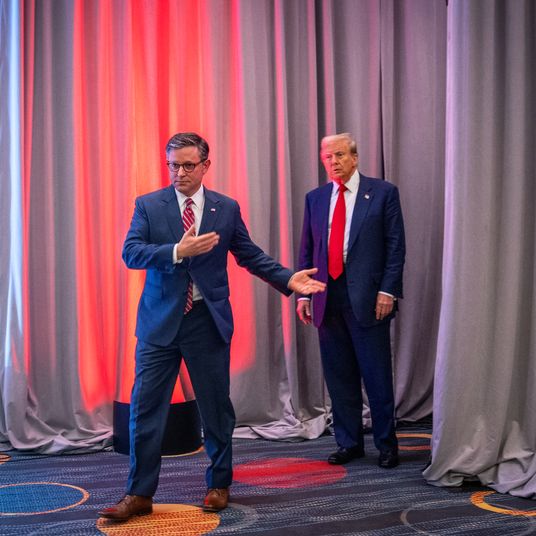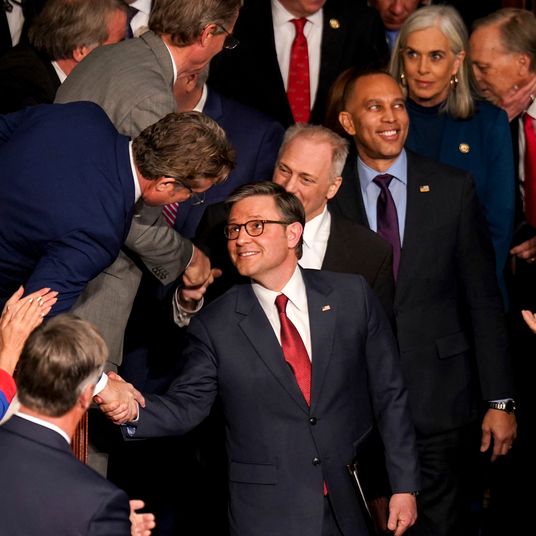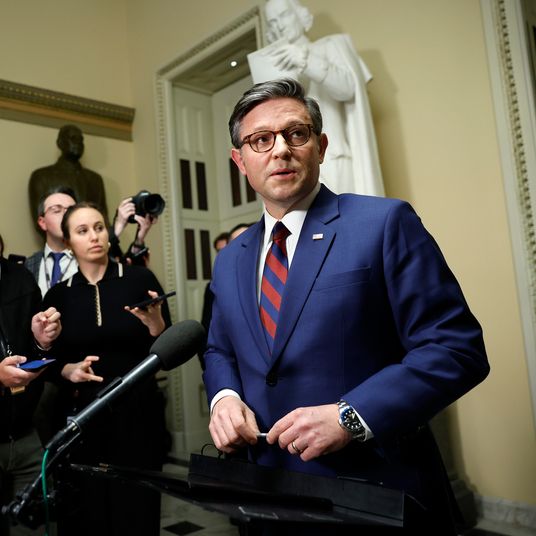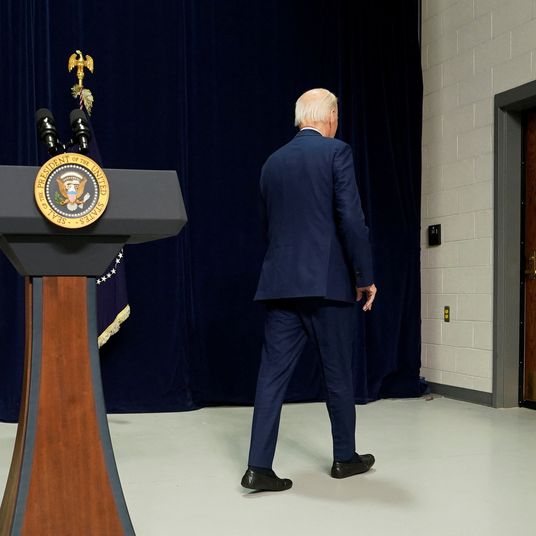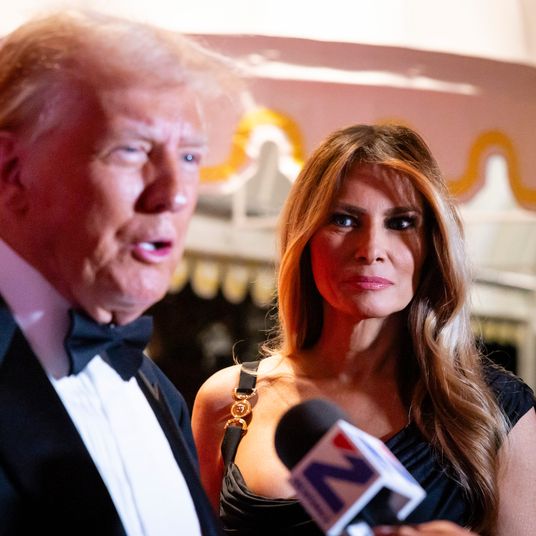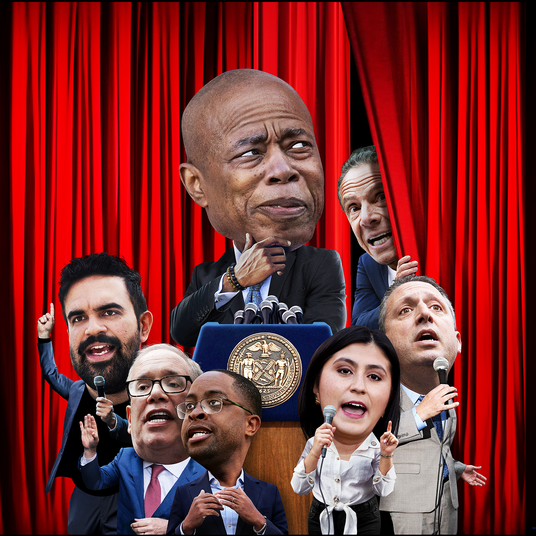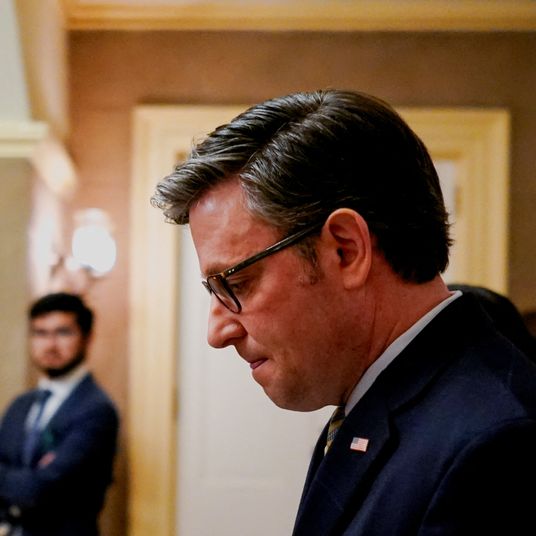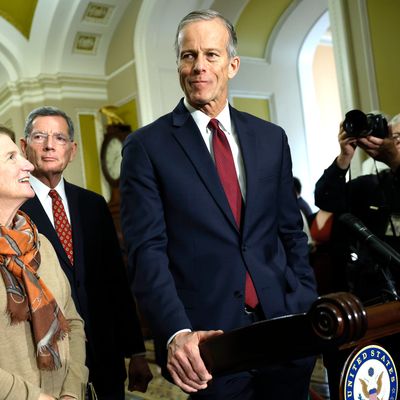
As members of Congress returned to Washington this week, the focus was on Mike Johnson, who narrowly won reelection as House Speaker after initially failing on the first ballot. But in the longer run, the locus of legislative action in the second Trump administration is likely to be the U.S. Senate, where the new majority leader, John Thune, is succeeding Mitch McConnell, who served as GOP leader for a remarkable 18 years.
There are several reasons to pay a good deal more attention to Thune than his low-key demeanor demands. First, he has a comfortable three-seat majority in the Senate that makes him significantly more secure in his position than his House counterpart, Johnson. Second, the mechanics of legislating during a party trifecta place a huge premium on managing the Senate and avoiding minority-party filibusters. And third, Thune has given every indication that he will bend the knee to the wishes of Donald Trump’s White House wherever he can. In this, he differs significantly from McConnell. The Kentuckian, whose idol is 19th-century congressional wizard Henry Clay, invariably cooperated with Trump when the chips were down during the 45th presidency. But he always maintained a degree of independence and never exhibited the abject loyalty Trump craves. Though Thune angered Trump by refusing to support his effort to overturn the 2020-election results and endorsing Tim Scott for president in 2024, Thune does not appear to share McConnell’s determination to show that the GOP and the Senate are institutions with a larger mission than MAGA.
There will be two crucial tests ahead for Thune in the immediate future. The most obvious will be managing the confirmation of Trump’s Cabinet, federal agency, and diplomatic nominees. Democrats and media outlets will be eager to provide lurid information on some of the more problematic Trump nominees, but it’s clear that the initial horror over such choices as Pete Hegseth, Kash Patel, Robert F. Kennedy Jr., and Tulsi Gabbard has subsided to a significant degree. Thune will be responsible for making sure nearly all of Trump’s appointments stick — and for choosing the right moment to suggest abandonment of nominees who get caught up in viral scandals or just don’t have the Republican votes to survive.
Thune’s handling of Trump’s legislative agenda may not attract as much publicity early on, but he’s making potentially critical decisions already, as the Washington Examiner reported:
“Friday votes will be the norm, and we’re not going to be having much in the way of recess in the first 100 days,” Thune said in a recent Senate floor speech. “That’s because we have a lot of work to do, and we’re not going to get it done on the kind of abbreviated schedule that we’ve had in 2024” …
As part of Thune’s “aggressive” Senate schedule, the incoming majority leader wants to move two separate budget reconciliation packages, which are not subject to the 60-vote filibuster.
The first would come in Trump’s first 100 days and focus on “once in a generation” spending for border security and defense. The second would come later in the year and center on extending Trump-era tax cuts that are set to expire after this year.
Budget-reconciliation bills will be Trump’s primary vehicle for moving big packages of legislation while Republicans have a trifecta for the next two years. These bills have to be reviewed by the Senate parliamentarian to determine if all their provisions are fiscally relevant, which protects them from filibusters. Much of the craftsmanship that goes into these crucial measures will occur under Thune’s supervision. Needless to say, the Senate leader will also have to constantly stay in touch with the White House and with fractious House Republicans to ensure his handiwork can actually make it through Congress and secure Trump’s signature.
One final Thune quality that will be put to the test is his reputed affability. McConnell ruled the Senate as a centralized fiefdom, repeatedly angering backbenchers (and particularly hard-core conservatives) by failing to consult with them or to explain his decisions. Aware that MAGA senators like Scott and Mike Lee and Tom Cotton will have a ready audience in the White House for complaints about how the chamber is being run, Thune is sending early signals that demands for “reforms” in Senate operations will be heard, as the New York Times reports:
Mr. Thune has made significant promises about how the Senate will conduct itself on his watch … He said he also intended to bring more bills to the floor and allow amendment fights when recent leaders of both parties have sought to limit political exposure by limiting the number of votes senators have to take.
New leaders in Congress often say they will restore “regular order,” only to abandon the pledge once it becomes politically treacherous and sparks grumbling from colleagues who want to get out of the Capitol for fund-raising travel. Mr. Thune seems determined to stick to his guns.
All in all, the South Dakotan seems to be a good choice of Senate leader for a Republican Party charged with implementing Trump’s radical legislative agenda, without much overt drama to detract attention from the White House dramatics the once and future president prefers. But like his party in Congress, Thune won’t have much of a margin for error and can’t count on a great deal of patience from the man who can make or break him whenever he chooses.
More on Politics
- Could Congestion Pricing Still Get Blocked Before Sunday?
- The Real Speaker Isn’t Mike Johnson
- Mike Johnson’s Problems With the Right Have Been Deferred, Not Solved








